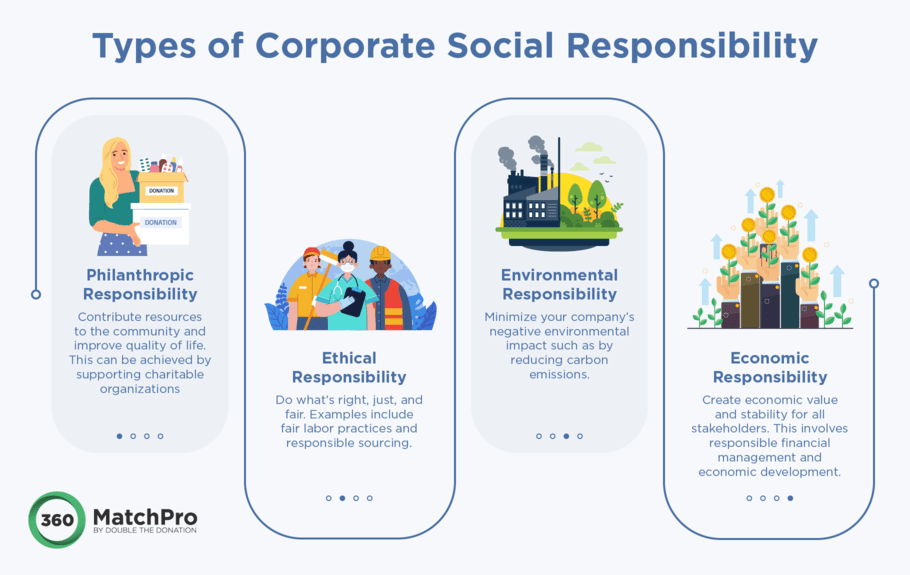The concept of Corporate Social Responsibility (CSR) has gained significant traction. But what exactly does it mean for a company to be socially responsible? How can businesses effectively implement CSR practices that not only benefit society but also enhance their reputation and profitability? This blog will explore the definition of corporate social responsibility, its benefits, and best practices for implementation.
Understanding Corporate Social Responsibility
Corporate Social Responsibility refers to a business model where companies integrate social and environmental concerns into their operations. This approach goes beyond mere compliance with legal requirements, it involves a commitment to ethical behavior, sustainable development, and community engagement.
CSR can manifest in various forms, including:
- Environmental initiatives: Companies adopt sustainable practices to minimize their ecological footprint.
- Philanthropy: Businesses engage in charitable giving or support community projects.
- Ethical labor practices: Ensuring fair treatment and working conditions for employees.
- Community engagement: Actively participating in community development through volunteerism or partnerships with local organizations.
Benefits of Corporate Social Responsibility
Implementing effective CSR strategies can yield numerous benefits for companies, including:
- Enhanced brand reputation: Companies recognized for their social responsibility often enjoy a positive public image, which can lead to increased customer loyalty.
- Attracting talent: Employees are increasingly seeking workplaces that reflect their values. A strong CSR program can help attract and retain top talent.
- Risk management: Companies that prioritize CSR are better equipped to manage risks related to social and environmental issues.
- Increased profitability: Studies have shown that socially responsible companies often outperform their less responsible counterparts financially.
Source: 360matchpro.com
Best Practices for Implementing CSR
To effectively integrate corporate social responsibility into business operations, companies should consider the following best practices:
1. Align CSR with business goals
CSR initiatives should align with the overall mission and values of the organization. This ensures that efforts are not only meaningful but also sustainable in the long term.
2. Engage stakeholders
Involve employees, customers, suppliers, and community members in the development of CSR strategies. This collaborative approach fosters a sense of ownership and accountability.
3. Measure impact
Establish metrics to assess the effectiveness of CSR initiatives. Regularly evaluate progress and make adjustments as needed to maximize impact.
4. Communicate transparently
Maintain open communication about CSR efforts with stakeholders. Transparency builds trust and demonstrates a genuine commitment to social responsibility.
5. Foster a culture of responsibility
Encourage employees at all levels to embrace CSR values. Training programs and workshops can help instill a sense of purpose and responsibility within the workforce.
Examples of Successful Corporate Social Responsibility
Several companies have successfully implemented CSR initiatives that set benchmarks for others:
- Patagonia: Known for its environmental activism, Patagonia donates 1% of sales to environmental causes and encourages customers to buy used products through its Worn Wear program.
- Ben & Jerry's: This ice cream company is committed to social justice issues, including climate change and racial equity, integrating these values into its business practices.
- Starbucks: The coffee giant has made significant investments in ethical sourcing, community development, and employee welfare, establishing itself as a leader in corporate responsibility.
Conclusion
Corporate Social Responsibility is not just a trend, it is an essential aspect of modern business strategy. By embracing CSR, companies can create positive impacts on society while enhancing their own sustainability and profitability. As consumers increasingly demand accountability from businesses, those that prioritize corporate social responsibility will likely thrive in the competitive landscape.
By implementing best practices and learning from successful examples, organizations can effectively navigate the complexities of CSR and contribute meaningfully to their communities while achieving their business objectives.
Tips for Employers: Recruiting Guides





